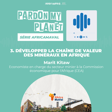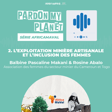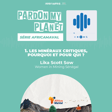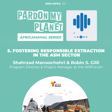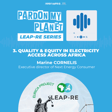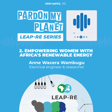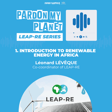Become a Creator today!Start creating today - Share your story with the world!
Start for free
00:00:00
00:00:01

From crisis to innovation: Exploring renewable solutions with LEAP-RE
We are joined by Sigfried Tivana, assistant director at the Department of Science and Innovation in South Africa and co-coordinator of LEAP-RE. Sigfried discusses the pressing energy challenges facing South Africa, from access issues to the sustainability of current energy practices. He also shares the challenges of piloting such a large program as LEAP-RE and what the future holds for this initiative.
More information on: lgi.earth/podcast
Transcript
Introduction to Renewable Energies in Africa
00:00:09
Speaker
Hello and welcome to Pardon My Planet podcast. I'm Anne Charlotte, your host. and This is the fourth episode of a series dedicated to renewable energies in the African Union countries. You can listen to the other episodes on major platforms and on lgi dot.earth website.
Featuring Guest Siegfried Sivana
00:00:27
Speaker
We welcome today Siegfried Sivana. He is Assistant Director at the Department of Science and Innovation in South Africa. He is also the co-coordinator of the Long-Term Joint Research and Innovation but Partnership on Renewable Energy between the European Union and the African Union, also known as LIPRI.
00:00:49
Speaker
Hello Siegfried and welcome. Hello Anne, we are very excited to be part of this conversation. Looking forward to the discussions. same Same here, thank you very much for taking the time to chat with us.
What Are South Africa's Energy Challenges?
00:01:01
Speaker
I would like to start with a question about ah South Africa since ah you are from there and what are the specific challenges that is facing South Africa in terms of access of energy and also the use of energy. Thanks, Charlotte, for the question. um Well, ah quite a very relevant question, of course, for South Africa, ah given that we are facing quite a number of challenges when it comes to energy, ah energy supply in on the country for both private and family use, I mean, for both industrial industry and family use.
00:01:41
Speaker
ah The biggest challenge is that our grid is not able to meet the demands of both industry and private use, which then means that we face ah blackouts from time to time. The intensity of these blackouts have increased over years to a point where almost half a day our time we are in blackouts, which then necessitate on our part the the need to look for solutions to address these problems.
00:02:13
Speaker
And of course, in addition to the prevailing problem is ah the global challenge of climate change, which has to be addressed as well. ah So solutions that have to be sought would be solutions that speaks to clean energy. And of course, as we move along, we need to address, of course, ah how we then transit from the use of fossil fuels add to ah clean energies across board. So that is that is the biggest challenge in South Africa. But of course, and in terms of energy access, ah the grid has been stretched to a point where it has reached rural areas and remote ah places.
00:03:04
Speaker
And perhaps this stretching of the grid is responsible then for the ah the additional demand, which then becomes more excessive for the grid to
Historic Expansion of Electricity Post-Apartheid
00:03:17
Speaker
sustain. And how can you ever explain maybe this stretching of the the grid? So um South Africa has ah over the last 80 years been in the process of transiting from the previous government, which was ah a government known as apartheid, where services such as electricity were only reserved for the whites. So only ah white towns
00:03:49
Speaker
and cities had access to electricity. So the grid was created specifically to service ah white areas which were were quite few, which are quite few in South Africa because ah the white air population is a minority group up here. So when 1994 came and we South Africa was ushered into a democratic dispensation, A lot of services which were reserved to whites had to, of course, be stressed to also accommodate the black majority, including the grid.
00:04:27
Speaker
and including more communities into the grid meant that there was now a lot of load in the grid and the grid could not sustain that load. Hence ah the concept of what we call load shading in South Africa, which is basically the blackouts in different areas which are scheduled to reduce the load that is ah the pressure that is being put on the grid so that the grid does not collapse basically.
Research on Energy Mix and Transition
00:04:56
Speaker
Knowing that ah there is also this need to do the energetic transition, what are the priorities of research in South Africa regarding those challenges? but Research is quite crucial. It's playing a very pivotal role in this just energy transition undertaken by South Africa. and So we are looking at an energy mix from different energy sources
00:05:22
Speaker
We do ah accept at this stage that the solar and wind and and the likes, the technologies are not at the stage where they can sustain um the energy needs of the country for both industry and private use. So there is a need for research to expand on ah different um energy technologies, whether we're talking energy storage, where now whether we're talking solar PV, wind energy and the likes. So those are the things that are, of course, in in in
00:05:55
Speaker
ah in in the conversations within the counter. But of course, we we also support quite a number of projects, whether it's biomass, whether it's solar, whether it's ah wind energy, and and and so on. And energy storage, which is quite important if you were to talk renewables, because we need to store this energy. So those those are the the I mean, research is is is in the center of this transition. It continues to improve from time to time. The innovations that are already available, it brings in new innovations. Also in South Africa, of course, we have huge deposit of fossil fuels such as coal.
00:06:37
Speaker
There is also of course an ongoing research around carbon capture and sequestration of the carbon that is already in the atmosphere. So how do we deal with that so that we are able to of course ah not destroy the existing industries ah but at the same time not damaging the atmosphere and the environment. So there is a balance that needs to be struck and there's a balance that needs to be struck economically as well because As we move into renewables, ah they therefore we need to understand that the fossil fuel industry was, of course, employing a significant number of people in South Africa. So all those things need to be balanced, of course, so that we don't create a disaster in our economy.
00:07:23
Speaker
where we just transition. And of course, hence we focus more on the way just because just means that justice needs to be served in the system such that no one is left behind, basically. Right.
Investment in Renewable Energy Sources
00:07:40
Speaker
And is there a type of renewable energy on which South Africa is maybe particularly investing on or counting on for this transition? ah South Africa is big on solar and wind. We're big on these two renewable energies because we are able to harness, I mean, we are well endowed in that in that area. And I'm saying the focus now is on solar and wind to feed to the grid. But we also focus on ah green hydrogen or clean hydrogen.
00:08:14
Speaker
which will feed to other needs as well, such as ah mobility and and perhaps to also feed to some extent ah to the grid. I think it just grows. Yes, and we're experiencing power cuts actually. as you Oh wow, okay. So we were talking about power shortage and it happens right during the recording, so we are really in the topic. Absolutely. South Africa is also big on hydrogen. We are advancing that research space. In fact, we are advancing that in that space so far as innovation is concerned to a point where we do expect to reduce hydrogen and store it and export it to Europe. But of course, to to the rest of the continent, it is needed as well.
00:09:03
Speaker
and We are working of course in this kind of initiatives with some ah innovators and researchers from the region. I know Namibia has big on hydrogen as well. so But HIISA, which stands for Hydrogen South Africa, is funded by the Department of Science and Innovation to of course focus on hydrogen related research to addressing the energy needs of the country. And yeah there are in place to sell our hydrogen to Europe for cooling, especially now that winter is coming. You are not only buying most of your gas from
00:09:48
Speaker
from other places that I wouldn't mention. yeah so exactly yeah and so That makes also a lot of priorities i guess in research at the same time, so I guess you must be quite busy with all of this. Absolutely. ah The DSI, the NRF, our universities and different entities of the DSI is quite invested in finding you know solutions for our energy problems. And not only for our energy problems, but of course there are opportunities even when there are no actual problems that we are solving, new markets you can tap into. So
Is Europe Learning from Africa's Renewable Efforts?
00:10:28
Speaker
we are very much invested in
00:10:30
Speaker
of the renewable energy related research, solar, wind, and so on. That's why we fund quite a number of research projects, 12 projects to be specific within the Libri partnership. I think one number second, if not third, in terms of the number of projects that are funded by a funding agency within the European, I mean the EU-AU partnership, the Libri partnership to be specific. So um yeah, we are were highly invested in this space. We also
00:11:03
Speaker
I see collaboration with the Europe as as is quite pivotal for our research undertakings. It's pivotal in the sense that and there is a lot to learn from Africa. I must add there that there's a lot of things that Europe can learn from from researchers in Africa, because there's quite a lot of things that African researchers can learn from European researchers. And the same breadth, I think, ah Europe is quite advanced in terms of research infrastructure and we can tap into that research infrastructure ah through this collaboration and that would of course serve both the African and the European interest in that. And of course, as I've i've said before, that i the European and Union is also interested in the African markets.
00:11:54
Speaker
and And I do think that it's high time the Africans are also interested in the European markets. you know head Like I said, you want to sell our hydrogen to Europe as well. As much as I know, Europe want to sell some of their technologies to Africa. And so understanding the markets, it's important and this kind of project, they also facilitate that sort of understanding of what are the needs in the ground. um And how can these needs to be met and therefore we facilitate the involvement of business. And that is how business comes in because we also have our projects that are almost at the most advanced stages and we want investment from the private sector.
00:12:35
Speaker
The private center obviously is profit driven. They're looking at their markets and how they can of course um sell their products. So we should benefit both Europe and Africa should benefit in in in that in that as well. When you talk about the fact that Europe has a lot to learn from Africa, do you have any specific examples in mind?
00:12:59
Speaker
Yes, I have a lot of um ah examples in mind. There are a lot of innovations that comes from that came from Africa, um and therefore these innovations as they are exported to the rest of the world. It is, of course, that kind of ah you know this kind of collaboration that facilitates co-learning. um Also, learning to understand the needs of Africans. um You know, there are a lot of things that Europe needs to understand about Africa, where it is going, what it wants to achieve, what Africans, and Africans, of course, they are they are quite ah diverse. It's not, when I say Africans, I'm not talking, you know, um
00:13:49
Speaker
a homogeneous kind of a community, quite diverse community of people, different countries, even in one country, such as South Africa, you know, the div diverse ah communities across the country, in different provinces. So understanding the needs of all this, how they live, how they want to continue to live, and some of um the solutions, research solutions that come out. There are people who but who prefer to live off-grid. And off-grid solutions are good for such people. There are people who who are nomadic. That is their lifestyle in some parts of Africa. When their are needs used to be met, that's why they would need and solutions that speaks to their needs because they are not grounded in one place. You can't build a grid, a mini-grid for them or anything of that sort.
00:14:40
Speaker
so But there are a lot of things that we can learn from each other. And I'm emphasizing this because I want us to move away from a notion that Africa learn only from Europe. Or technology transfer is one sided. Technology or knowledge transfer will transfer knowledge from Europe to Africa. not but the other way around. So I believe it's co-learning. I believe we are capable we have capable researchers here in Africa. That is why our projects are not only led in Europe, and even if they are led in Europe, some of them.
00:15:12
Speaker
There are different principal investigators, different countries, different working packages. So don't say in this project you are responsible for this aspect. In that project, you're responsible for that aspect. So different partners in both continents have their own unique contribution in the project and has the collaboration. and It's quite important in that sense.
Managing the LIPRI Program
00:15:35
Speaker
as we said, you are the co-coordinator of Lipri and you have all these projects at different scales, different settings, different countries. How do you make it work in one program? And yeah, how do you make maybe yeah this harmonization as much as you can, if you if you can, because as you say, it's very diverse.
00:16:00
Speaker
you know um Libre is a very dynamic program and very exciting as well. ah It's exciting because you learn every day. So we we come as as as managers from different institutions ah with all our experience in managing different projects, but we have never managed a project of this magnitude, ah at least all of us. um And it then it then it then demands an attitude that I need to learn to understand how to manage a multi-stakeholder program of this multitude.
00:16:35
Speaker
the needs of different stakeholders. They have a vacancy of interests. you know Everyone comes into the project with their own interests in mind to say, I want i want to achieve this. And it needs and there very sound leadership that is able to manage conflict. So we have really done a tremendous job. I've joined this program in its second year. And I've been with the program and mean since then. And we have come across a lots of, you know, challenges and we had to solve them in a manner in which it keeps the program intact. It's quite, it's very difficult.
00:17:21
Speaker
because you are trying to so to keep everyone united, but also you have to two through two to also serve what the project wants to achieve, not what each and every individual wants to achieve. So it's very it's it it was a learning curve, at least for me as an individual, and I think ah perhaps for our colleagues at LGI as well, who are coordinating the main coordinators of this program. because they had to manage all those divergent interests that I've already mentioned. But it's also interesting because it boosts a lot of resources, human resources, a lot of amazing ideas. So in the end, it works. even though if it's a lot of work It is a lot of work, but it works. you know it It also requires dedication. You must be in touch with what is happening in each and every web package because if you look away...
00:18:18
Speaker
People are disagreeing on this or on that. So you have to inter intervene, you know. So you need to be quite hands on in managing this project. But it was it was it's quite a success in my view. The problem is quite a success in that it has been able to manage, as I've said, this humongous structure. and and this huge project that consists of all these 83 partners, 83 organizations, not individuals, you know, these are organizations we're talking about. And each and every organization brings perhaps two or three people. So there's a huge community that has been formed within the Libre program. And of course, through our clustering activities is as well, we are forming ah quite a huge but
00:19:04
Speaker
renewable energy community externally from the LIPRI project so that it becomes even more bigger. but Once LIPRI is ah over, what's it's going to what's going to happen hu bute to all the projects you will have been helping?
Goals of LIPRI: Partnerships and Public Benefit
00:19:21
Speaker
but So the Libri program aims to build a long-term partnership within the RE space and this is of course born out of the realization that we're finding a lot of projects and we need to see them through until they achieve the the their intended objectives. You cannot find a project and leave it halfway through. So we do hope that we will be able to build this long-term partnership
00:19:47
Speaker
which will coordinate all the ah renewable energy projects within the EU space. But um of course, we also, like I've said, try to up appeal to different stakeholders, ah fund us as well in the private sector space to come on board and look into some of the projects that have good value proposition for them and invest in them. So those are the things that we are looking at um beyond the five year time lifespan of the project, which is ending here now in 2025. So yeah, we hope that but there will be there will be a follow through on the projects that we are currently funding. And also, what is also very crucial is that we hope that the project will benefit they are both the African and the European communities alike.
00:20:42
Speaker
that the solutions will not be channeled towards the private capital, which would then mean it benefits business in Europe or and and and elsewhere. That is very important, but there should be co-ownership of the intellectual property. So it's that if such intellectual property is commercialized, project participants, should I say, or in principle investigators and other researchers would also benefit from the commercialization of this intellectual property.
00:21:17
Speaker
So most of us who are funding the Liberal projects are public sector funders using tax payers money. The European Commission is also using tax payers money. Different funding agencies in Europe are also using tax payers money. So these public funds, it should one way or the other benefit the public in both in Europe and Africa. and i think that's a perfect way to conclude our episode. Thank you so much, Siegfried, for taking the time to chat with us. Yeah,
Conclusion and Further Resources
00:21:50
Speaker
thanks. um This was quite an interesting conversation. Absolutely. If you want more information on Lipri and renewable energies, and if you want to listen to the other episodes of the series, you can do it on lgi. dot earth slash podcast. Until next time. Bye bye.
